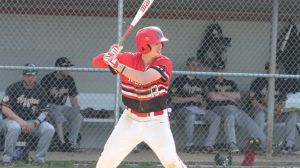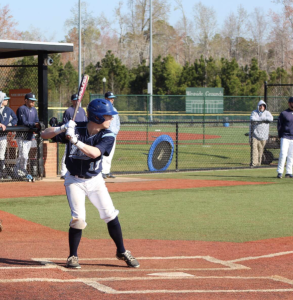As the loud alarm goes off on Joe Suppa’s iPhone 8 Plus, he reads the time as 5:20 a.m. on his phone and it’s time to get ready for a 6:00 a.m. lifting session. It is the start of a busy week for senior business management major, Joe Suppa. As Suppa attempts to keep his grades up, being a student athlete has a big role in his time management skills as a D3 athlete.
Time management skills are a key factor in any college student’s life but being a college athlete takes time management to a whole other level.
 “Practice usually takes up a big chunk of our time, being a college athlete, and trying to keep my grades up, it isn’t easy,” senior business management major and Division III second basemen at Albright University Joe Suppa said. “It does get tough sometimes, but you have your teammates there to keep you going because they are going through similar experiences.”
“Practice usually takes up a big chunk of our time, being a college athlete, and trying to keep my grades up, it isn’t easy,” senior business management major and Division III second basemen at Albright University Joe Suppa said. “It does get tough sometimes, but you have your teammates there to keep you going because they are going through similar experiences.”
There are many different levels of athletics that a high school student has to choose from given they have been accepting and are being recruited by the school. The recruiting process is a whole different monster of time commitment but for high school students.
Let’s focus on Division I, Division II, Division III and some junior college (JUCO) athletic programs. Every division takes up a good amount of time whether you sit the bench for a JUCO athletic program or are a Division I starting shortstop. The team practices together so everyone is putting in the same time, unless you take it upon yourself to improve and practice that requires even more time.
 “As a a Division II athlete, it can be challenging at times but my coaches and professors really worked with me with missed classes for games and assignments,” alumni pitcher of West Chester University Ron Bailey said. Often times, athletic programs can be compared to higher level athletic programs.
“As a a Division II athlete, it can be challenging at times but my coaches and professors really worked with me with missed classes for games and assignments,” alumni pitcher of West Chester University Ron Bailey said. Often times, athletic programs can be compared to higher level athletic programs.
According to NCAA, Division I athletes spend 6 hours on academics, 5.7 hours on athletic events such as practices and games, 3.3 hours of a social life and 7 hours of sleeping. That only leaves 2 hours left in a single day. We did not include time for eating, employment, or extra curricular activities.
As Division II athletes spend 5.7 hours on academics, 5.5 hours on athletics, 3.6 hours on a social life and 6.9 hours of sleeping.
“I went the JUCO route because I wanted to focus primarily on baseball rather than academics,” said junior outfielder for Middlesex County.” Division III levels give much more space as it shows 6.2 hours on academics, 4.8 hours on athletics, 3.6 hours of a social life and 7.2 hours of sleeping.
Many of these hours are crucial hours that are needed for a college athlete, or even for a basic college student. Eating, sleeping, extra curricular activities, and academics are basic hours spent throughout a college students experience. Maybe you want to have a little social life as well.
However, if you throw in an extra 5 hours of athletics, their time management skills are tested enormously. This usually starts the argument of why college athletes should be paid. It isn’t a bad thought after seeing how much time they put in.


